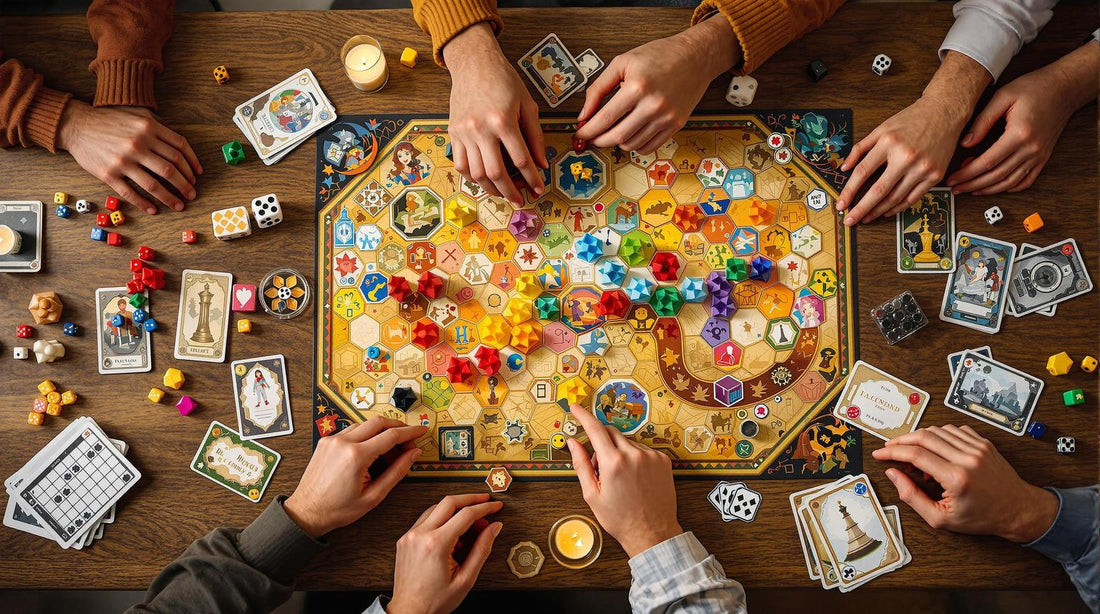Discover the Best Board Games for Every Player

What Ends a Round in Tabletop Games?
Rounds in tabletop games end based on specific rules that set the pace and strategy. Here are the 5 main ways rounds conclude:
- Set Number of Turns: Fixed turns provide predictable planning (e.g., Lords of Waterdeep).
- Resource Depletion: Rounds end when shared resources run out (e.g., Ticket to Ride).
- Player Choices and Passing: Players decide when to end by passing (e.g., Kingdomino).
- Time Limits: Real-time pressure with timers (e.g., Galaxy Trucker).
- Goal Achievement: Rounds end when objectives are completed (e.g., 5-Minute Marvel).
| Round-End Type | Key Feature | Example Game | Strategic Impact |
|---|---|---|---|
| Set Number of Turns | Predictable structure | Lords of Waterdeep | Supports long-term planning |
| Resource Depletion | Natural countdown | Ticket to Ride | Promotes resource management |
| Player Choices/Passing | Flexible timing | Kingdomino | Rewards tactical decisions |
| Time Limits | Real-time urgency | Galaxy Trucker | Demands quick thinking |
| Goal Achievement | Milestone focus | 5-Minute Marvel | Prioritizes key objectives |
These methods shape how players strategize, compete, and adapt, making round-end rules essential to a game’s flow and excitement.
Related video from YouTube
5 Main Ways Rounds End
Modern board games often conclude rounds using one of five core methods. Each method shapes the gameplay experience in distinct ways.
Set Number of Turns
Some games stick to a fixed number of turns, giving players a clear framework for planning. For instance, Lords of Waterdeep uses an eight-round structure. This consistency lets players strategize across multiple rounds with confidence.
Running Out of Resources
When resources run out, it naturally signals the end of a round. Ticket to Ride uses this effectively: the final round begins when any player has two or fewer trains left. This creates a sense of urgency, as players must decide how to use their remaining resources wisely.
Player Choices and Passing
In certain games, players control when a round ends by passing. In Kingdomino, the round concludes once all players pass after placing their dominoes. This makes timing a key part of the strategy.
Time Limits
Some games add real-time pressure with strict time constraints. Galaxy Trucker uses a sand timer during its ship-building phases, creating a fast-paced, high-pressure environment. This adds urgency and forces players to think quickly.
Goal Achievement
Rounds can also end when specific objectives are met. In 5-Minute Marvel, players finish rounds by completing designated temple goals. This approach encourages players to focus on achieving milestones efficiently.
| Round-End Type | Key Feature | Example Game | Strategic Impact |
|---|---|---|---|
| Set Turns | Predictable structure | Lords of Waterdeep | Supports long-term planning |
| Resource Depletion | Natural countdown | Ticket to Ride | Promotes resource management |
| Player Passing | Flexible timing | Kingdomino | Rewards tactical decisions |
| Time Limits | Real-time urgency | Galaxy Trucker | Demands quick thinking |
| Goal Achievement | Milestone focus | 5-Minute Marvel | Prioritizes key objectives |
Each of these methods affects how players strategize, compete, and adapt to the game's pace. These dynamics play a critical role in shaping the overall gameplay experience, as we'll discuss in the next section, 'How Round-End Rules Shape Gameplay'.
How Round-End Rules Shape Gameplay
Planning and Decision-Making
Round-end rules play a major role in how players plan their moves and make choices during a game. In games with fixed-round endings, such as Sagrada, players can carefully calculate their remaining actions, allowing for precise planning and efficient use of resources. This predictability supports long-term strategies and thoughtful decision-making.
In goal-oriented games like Undaunted: Normandy, the effect of round-ending rules becomes even more apparent. Players must frequently adjust their strategies based on how close they or their opponents are to reaching victory conditions. This creates a dynamic environment where players balance short-term advantages with their overarching goals.
Competition Between Players
When round endings are tied to limited resources, player interaction and competition often become more intense. Games that use resource depletion as a trigger force players to weigh different strategic approaches:
| Strategy Type | Player Focus | Impact on Gameplay |
|---|---|---|
| Offensive | Gaining Resources | Speeds up the round's end |
| Defensive | Blocking Opponents | Extends the round |
| Balanced | Efficient Use of Resources | Keeps the game steady |
These mechanics often lead to tough choices - should players focus on their own progress or take actions to slow down their opponents? This balancing act adds layers of complexity and strategy to the gameplay.
Game Pacing
Time limits and unexpected round endings introduce unique pressure points that shape the flow of a game. In real-time games, for instance, the urgency of a ticking clock forces players to make quick decisions, which can completely shift the outcome.
Modern game designs often use flexible round-end conditions to keep players engaged. Timed rounds are especially effective at:
- Maintaining tension throughout the game
- Leveling the playing field between experienced and newer players
- Driving high-stakes decision-making under pressure
Whether a game uses predictable or uncertain round endings directly impacts how players assess risks. Fixed-round systems provide a steady rhythm, while resource-based triggers create moments of suspense and "push-your-luck" scenarios. These pacing differences keep gameplay fresh and unpredictable, making round-end rules a key element in game design.
Up next, we'll look at how designers craft these rules to maximize player engagement.
Making Good Round-End Rules
Designing round-end rules involves finding the right mix of predictability and surprise. This choice directly shapes the strategic depth players experience during the game.
Fixed vs. Random Endings
Fixed endings allow players to plan far ahead, as seen in strategy games like Agricola, where the farming year spans 14 rounds. On the other hand, random endings keep players on their toes, making them ideal for party games with unpredictable triggers.
Here’s a quick breakdown of the differences:
| Ending Type | Benefits | Best For |
|---|---|---|
| Fixed | Enables long-term planning, Ensures consistent play time | Strategy games, Tournament settings |
| Random | Builds tension, Boosts replayability | Party games, Casual strategy |
| Hybrid | Offers a mix of predictability and surprise | Medium-weight games |
Tying Theme to Mechanics
Round-end rules feel more natural when they align closely with a game’s theme and narrative. This connection not only immerses players in the world of the game but also makes the mechanics easier to grasp and remember.
For example, Robinson Crusoe ties rounds to day-night cycles, adding urgency and a sense of survival. Similarly, Ticket to Ride creates urgency through resource depletion, but Robinson Crusoe achieves it within a thematic context.
Designers can enhance this connection by incorporating elements like natural cycles, story-driven resources, or character-specific goals.
Take Pandemic, for instance. Its increasing infection rates naturally limit round duration, maintaining both competitive balance and thematic consistency. This approach ensures the mechanics support the overall narrative while keeping gameplay engaging.
sbb-itb-1ed942f
Games with Strong Round-End Rules
Games with Set Rounds
In Terra Mystica, the game spans six rounds, each offering timed scoring bonuses that encourage players to think ahead. Every round introduces specific bonus actions and scoring opportunities, pushing players to balance short-term benefits with their long-term strategies.
Games that Use Resource Limits
Dominion features two ways to trigger the game's end: depleting three Kingdom card piles or running out of Province cards. This dual condition forces players to juggle building their decks while keeping an eye on victory point opportunities. The constant need to track these conditions adds tension and depth to the gameplay.
Games with Time Limits
Real-time games take a different approach by using time-based mechanics to dictate round endings. In Escape: The Curse of the Temple, a 10-minute soundtrack with audio cues drives the action. The relentless time pressure demands swift coordination, turning every second into a critical moment.
Similarly, FUSE challenges players to defuse bombs by matching dice combinations within a 10-minute timer. The countdown transforms this dice-placement game into a high-stakes race, where every decision feels urgent and impactful.
These examples highlight how round-end rules influence the pace of play and decision-making, shaping the overall experience and strategic depth of the game.
Summary: Round-End Rules Matter
Round-end rules play a key role in shaping how games are experienced, influencing both player engagement and the depth of strategy. In a survey of 500 gaming enthusiasts, 78% said these rules are a major factor in their enjoyment.
These mechanics define the flow of gameplay by introducing specific triggers that signal the end of a round. Whether it's a countdown of turns or a resource-driven finish, these triggers create natural moments of tension, encouraging players to make impactful decisions.
The design of round-end rules does more than just mark the conclusion of a round. They also:
- Provide structured breaks for scoring and resetting
- Keep players invested throughout the game
- Add layers of strategy
- Encourage meaningful decision-making
To keep games engaging, many modern designs combine different round-end triggers. This approach balances predictability with surprise, such as blending fixed turn limits with dynamic resource goals. The result? A mix of strategic tension, whether players are managing resources carefully or racing against a ticking clock. These varied conditions are key to crafting compelling tabletop experiences.
Find These Games at Brain Games

Want to dive into round-end mechanics? There's no better way than trying them out yourself. At Brain Games, you'll find a wide range of games that showcase these mechanics, catering to all sorts of gaming preferences.
For those into resource management, there are games where resource-driven conclusions bring tension and strategy to every turn.
If civilization-building is more your thing, Tapestry is a standout option. Its faction scoring and milestone-based round endings add an exciting layer of strategy, letting game phases shift naturally based on player choices.
Here’s what Brain Games offers:
- Comprehensive game descriptions that spotlight specific round-end mechanics
- Expert advice from in-store staff
- Game nights to try out different styles of play
- Worldwide shipping so you can get your favorite titles anywhere
With a strong 4.7/5 rating from 237 Facebook reviews, Brain Games is a trusted choice. Their selection highlights round-end mechanics, especially for Baltic customers, making it easy to find games that match your pace and play style.
Whether you're into classic turn-based games or new goal-driven systems, Brain Games has you covered with a curated collection tailored to your interests.
FAQs
What is a round in a game?
A round in tabletop games represents a complete cycle where each player takes their turn. This system ensures everyone gets an equal chance to play and helps maintain a steady flow of strategy and interaction.
For example, in Catan, a round wraps up once all players have finished gathering resources and trading.
Interestingly, over 70% of the highest-rated board games follow a structured round format (BoardGameGeek 2024).
It's always a good idea to refer to the game's rulebook, as some games may use unique definitions or variations for rounds.






